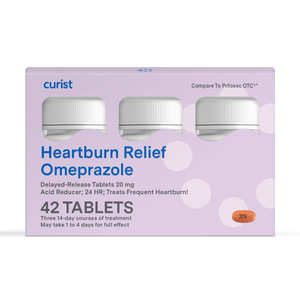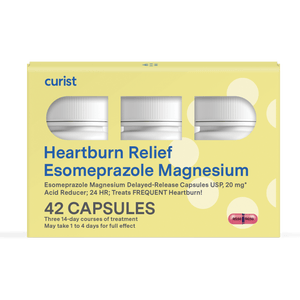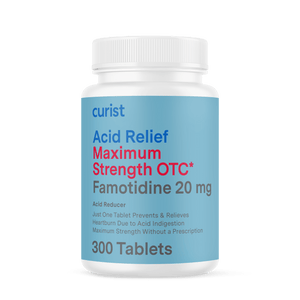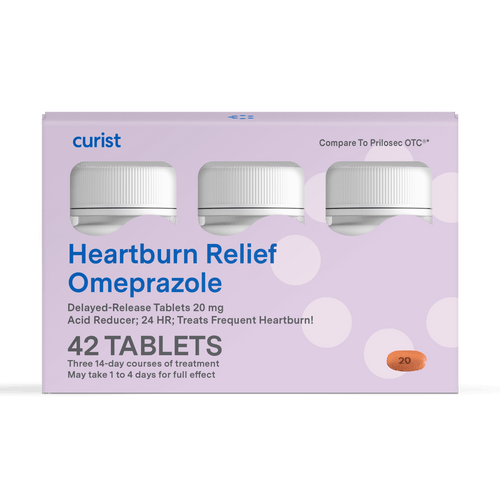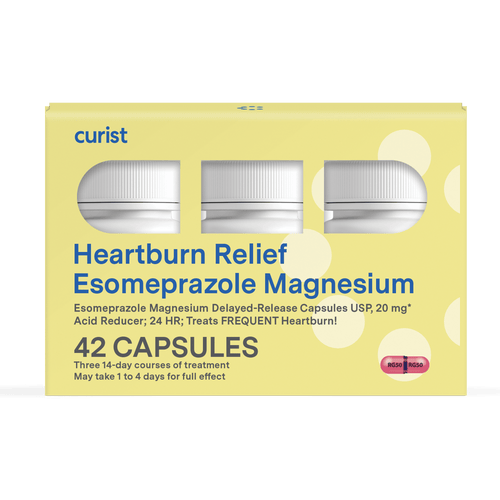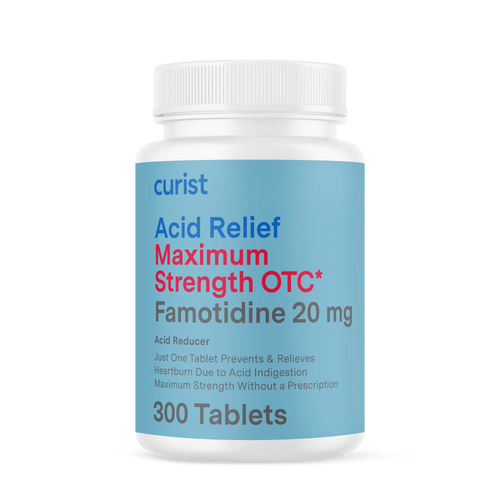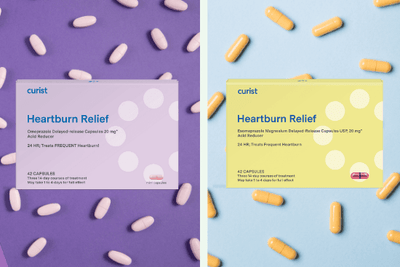By Alexiss Dennett-Zuniga, The University of Texas at Austin College of Pharmacy
Curist delivers over-the-counter medicines to your door at a fraction of the price of traditional brands. We hope everyone stays safe and healthy during this time.
Have you ever wondered what the difference is between Pepcid and Pepto-Bismol and which one would be the right option for you? You’re not alone! In this article, we will explore the differences between these two popular over-the-counter (OTC) medications and their efficacy for treating a variety of gastrointestinal discomforts.
What are the Differences Between Pepcid vs Pepto-Bismol (famotidine vs bismuth subsalicylate)?
Pepto-Bismol vs Pepcid: Active Ingredients
The active ingredient in Pepto-Bismol is bismuth subsalicylate, a salicylate antidiarrheal that works by coating the stomach lining, reducing inflammation, and providing relief from nausea, heartburn, indigestion, diarrhea, and upset stomach. Meanwhile, famotidine, the active ingredient in Pepcid and Curist Acid Relief, is an H2 blocker that helps relieve symptoms of heartburn and acid indigestion by reducing the production of stomach acid.
- Pepto-Bismol: Bismuth subsalicylate (262 mg)
- Pepcid: famotidine (10 mg, 20 mg, 40 mg)
Pepto-Bismol vs Pepcid: Primary Uses
H2 blockers, such as Pepcid (famotidine), are primarily used to prevent and treat mild and infrequent heartburn by lowering the amount of stomach acid made in the body. Pepcid starts working within 30 minutes and the effects can last up to 12 hours. Pepto-Bismol is primarily used to treat the symptoms of gastrointestinal distress, including upset stomach, heartburn, indigestion, nausea, and diarrhea.
Can I Switch from Pepcid to Pepto-Bismol? Can I Switch from Pepto-Bismol to Pepcid?
Pepto-Bismol is primarily used to treat symptoms like upset stomach, nausea, indigestion, and diarrhea. If symptoms align with these, it may be recommended to switch from Pepcid to Pepto-Bismol. On the other hand, Pepcid is primarily used to treat heartburn and acid indigestion caused by excess stomach acid production. It may be recommended to switch from Pepto-Bismol to Pepcid if these are your primary symptoms.
Can I Take Pepcid and Pepto-Bismol Together?
Pepto-Bismol and Pepcid are often used together and have limited interactions. However, H2 blockers, such as Pepcid, may increase the amount of bismuth absorbed from Pepto-Bismol. This may increase the risk of side effects such as constipation, diarrhea, and abdominal pain. While both Pepcid and Pepto-Bismol target digestive issues, their mechanisms vary, and taking them together may not enhance their effectiveness or provide any additional benefit.
Which is Stronger, Pepto-Bismol or Pepcid?
Pepto-Bismol and Pepcid work differently but are both used to treat gastrointestinal symptoms.
The strength of Pepto-Bismol and Pepcid depends on the specific symptoms that are experienced. If heartburn and indigestion are the common symptoms, Pepcid may be a more appropriate option as it reduces the amount of stomach acid made by the body. On the other hand, if nausea, diarrhea, or upset stomach are the primary symptoms, Pepto-Bismol may be better at addressing these more immediately than Pepcid.
Which is Best for Heartburn: Pepcid or Pepto-Bismol?
Heartburn is commonly caused by stomach acid backing up into the esophagus, leading to a burning pain in the chest or throat. Pepto-Bismol and Pepcid work differently but both can be used to address this particular discomfort. Pepto-Bismol works by coating the stomach lining and absorbing excess fluid from the intestines. Pepto-Bismol can last for several hours, which provides temporary relief from heartburn, but is shorter-lasting compared to H2 blockers. Pepcid works by reducing the production of stomach acid, which is a common cause of heartburn. Pepcid relieves heartburn for up to 12 hours, meaning that it lasts longer compared to Pepto-Bismol and is stronger in reducing stomach acid production and provides longer-lasting relief from heartburn.
Is Pepto-Bismol or Pepcid Better for Acid Reflux?
Acid reflux occurs when stomach acid flows up into the esophagus or throat. This commonly happens when the lower esophageal sphincter, the muscle at the entrance of your stomach valve, does not close all the way or opens too often. This repeated entrance of acid into the esophagus can lead to heartburn. Pepcid is more helpful at preventing acid reflux if taken before eating foods that are known to trigger your acid reflux. If acid reflux symptoms are mild and occur less than two times per week, Pepcid 10 mg can be taken twice a day. If symptoms continue after two weeks, Pepcid 20 mg twice a day can be taken for two weeks. However, if symptoms are not alleviated after taking Pepcid 20 mg twice daily for two weeks, a doctor should be consulted as treatment with a proton pump inhibitor (PPI) such as Esomeprazole or Omeprazole may need to be started.
Which is Best for Upset Stomach: Pepto-Bismol or Pepcid?
An upset stomach is pain or discomfort due to issues such as heartburn, diarrhea, or excess gas. Pepto-Bismol works by coating the stomach lining and absorbing excess fluid from the intestines, which makes it effective at treating a broader range of gastrointestinal symptoms. These include nausea, diarrhea, upset stomach, and indigestion. It is taken by mouth once every 30 minutes to an hour as needed for up to two days. Due to Pepto-Bismol’s mechanism of action, it may be better suited to treating an upset stomach compared to Pepcid and other OTC medications as it provides more immediate relief.
When is the Best Time to Take Pepcid or Pepto-Bismol? Is Pepto-Bismol or Pepcid Better to Take at Night?
When controlling heartburn symptoms, Pepcid can be taken 10 to 60 minutes before consuming food or beverages that cause heartburn. Pepcid should take effect within an hour and the effects last for up to 12 hours. Pepto-Bismol’s onset occurs within 30 to 60 minutes of taking a dose. Depending on the formulation used, a dose of Pepto-Bismol can be taken every 30 minutes as long as the maximum number of doses on the package is not exceeded. If nighttime heartburn is an issue, Pepcid is a more suitable option as it has a longer duration of action. The effects of Pepto-Bismol can last for several hours but may not last long enough to provide complete relief throughout the night.
Which is Best for Long Term Use: Pepcid or Pepto-Bismol?
Pepto-Bismol may be used for short-term relief of gastrointestinal symptoms but is not typically recommended for long-term use due to potential safety concerns and its limited efficacy in treating chronic health conditions. Pepcid is generally considered safer and more effective for long-term use in managing conditions like gastroesophageal reflux disease (GERD), heartburn, and acid indigestion, due to its mechanism of reducing stomach acid production. However, if symptoms worsen or persist for over 14 days, a healthcare provider should be consulted to perform further examination.
To learn more about treatment options for GERD, you can read more on our blog post on Best Heartburn Medicine for GERD.
When Should You Stop Taking Pepcid? When Should You Stop Taking Pepto-Bismol?
If symptoms of heartburn and acid reflux resolve, it may be appropriate to stop taking Pepcid. When taken for long periods of time, the body can develop resistance to medications like Pepcid. This means that with continuous use, there is a risk that Pepcid will not address symptoms of heartburn, acid reflux, and gastrointestinal upset as well as it did at the beginning of treatment. Pepcid use should not continue for over fourteen days without consulting a healthcare professional. Additionally, you should talk with a doctor if symptoms worsen or persist for over three months.
If gastrointestinal symptoms such as diarrhea, upset stomach, and indigestion resolve, discontinuation of Pepto-Bismol can be considered. Pepto-Bismol should not be used for over two days to decrease the risk of adverse reactions such as darkening of stool and constipation. If symptoms, such as diarrhea, persist for over two days, consult a healthcare provider.




